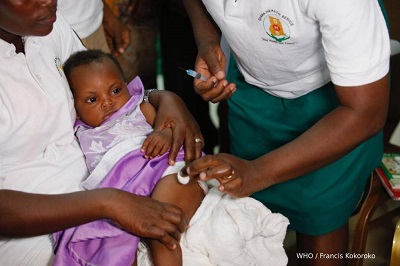
Malaria vaccine piloting starts in Ghana today
The piloting of the world’s first anti-malaria vaccine for children aged between six months and two years begins in six regions of Ghana today.
Known as RTS, S or Mosquirix, the vaccine is being introduced as a boost to Ghana’s National Anti-Malaria Programme.
The piloting will be done in 33 districts across the Bono, Bono East, Ahafo, Central, Volta and Oti regions.
In a speech read on his behalf at the national launch of the malaria vaccine implementation programme in Cape Coast yesterday, the Minister of Health, Mr Kwaku Agyemang-Manu, announced that the vaccine had undergone the relevant trials and proven to have a good safety profile.
The event was dubbed: “Malaria vaccine for Additional Protection.”
The vaccine is being introduced as part of routine immunisation for children through the Expanded Programme on Immunisation (EPI) of the Ghana Health Service.
Advertisement
A child will receive the vaccine in four doses: six months, seven months, nine months and 24 months. The pilot will run from 2019 through 2021.
Careful selection
The minister explained that the pilot regions and districts were carefully and scientifically selected based on their geographical location, their high prevalence of malaria, immunisation system and coverage of other malaria interventions.
He said approximately half of the districts in each of the regions would implement the pilot introduction, while the other half would serve as comparator districts to ensure that lessons were documented appropriately.
“The lessons we learn from these districts during this pilot phase of introduction will inform us on the roll-out of this vaccine to the rest of the country,” he said.
The minister said the programme on immunisation had since its establishment in 1978, contributed tremendously to reducing morbidity and mortality among children under five, adding that currently, the programme offered protection against 13 vaccine-preventable diseases.
First batch of vaccine
The Director-General of the Ghana Health Service (GHS), Dr Anthony Nsiah-Asare, said the service had taken delivery of 400,000 doses as first batch of the vaccine and distributed same to the targeted regions and districts.
He said the GHS would continue to monitor the safety profile of the vaccine as done for all other vaccines within the routine immunisation programme.
He said following the trials, the World Health Organisation (WHO) had pilot implementation of the vaccine within routine immunisation setting.
“The target is to vaccinate at least 120,000 children per year for three years in each of the three countries with high malaria burden. Following this, Ghana was selected as one of the three countries together with Malawi and Kenya to run the pilot,” he explained.
The Director, Malaria Vaccine Implementation Programme (MVIP-PATH), Mr Gordon Scott, said his organisation’s mission was to advance health equity through innovation, collaboration and strong partnership.
Potential
The Central Regional Minister, Mr Kwamena Duncan, said the vaccine had the potential to eradicate the disease.
He underscored the need for the people to take the issues of sanitation seriously, explaining that the project might not yield the desired results if the attitude of the people towards managing the environment remained the same.
“I believe we can combat the scourge when we put our hands together,” he said.
The Oguaamanhen, Osabarima Kwesi Atta II, who chaired the function, said since it took 30 years of painstaking investigations to come out with the vaccine, its efficacy would not be in doubt.
